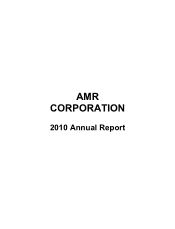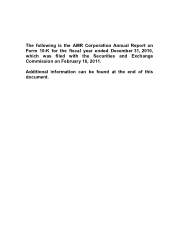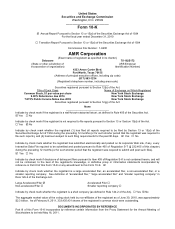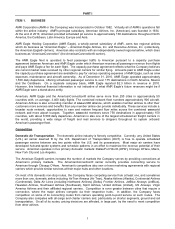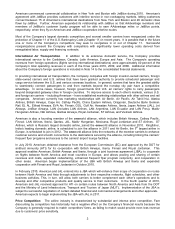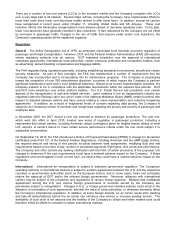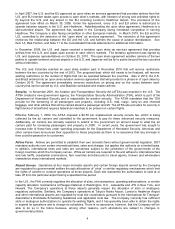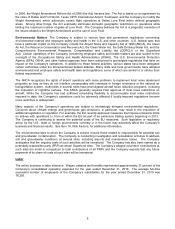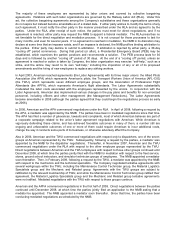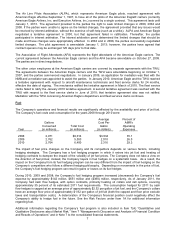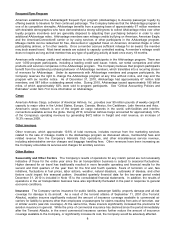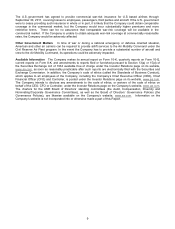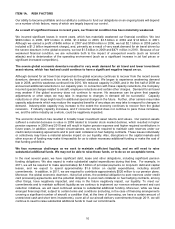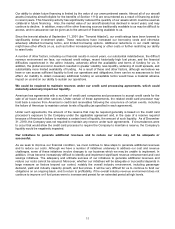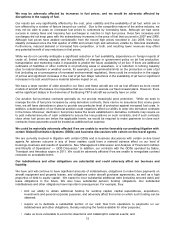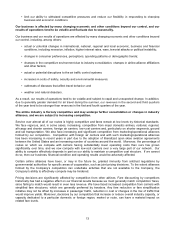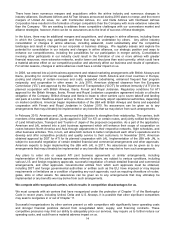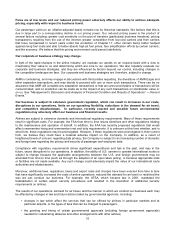American Airlines 2010 Annual Report Download - page 9
Download and view the complete annual report
Please find page 9 of the 2010 American Airlines annual report below. You can navigate through the pages in the report by either clicking on the pages listed below, or by using the keyword search tool below to find specific information within the annual report.6
The majority of these employees are represented by labor unions and covered by collective bargaining
agreements. Relations with such labor organizations are governed by the Railway Labor Act (RLA). Under this
act, the collective bargaining agreements among the Company’s subsidiaries and these organizations generally
do not expire but instead become amendable as of a stated date. If either party wishes to modify the terms of any
such agreement, it must notify the other party in the manner prescribed under the RLA and as agreed to by the
parties. Under the RLA, after receipt of such notice, the parties must meet for direct negotiations, and if no
agreement is reached, either party may request the NMB to appoint a federal mediator. The RLA prescribes no
set timetable for the direct negotiation and mediation process. It is not unusual for those processes to last for
many months, and even for several years. If no agreement is reached in mediation, the NMB in its discretion may
declare at some time that an impasse exists, and if an impasse is declared, the NMB proffers binding arbitration to
the parties. Either party may decline to submit to arbitration. If arbitration is rejected by either party, a 30-day
“cooling off” period commences. During that period (or after), a Presidential Emergency Board (PEB) may be
established, which examines the parties’ positions and recommends a solution. The PEB process lasts for 30
days and is followed by another “cooling off” period of 30 days. At the end of a “cooling off” period, unless an
agreement is reached or action is taken by Congress, the labor organization may exercise “self-help,” such as a
strike, and the airline may resort to its own “self-help,” including the imposition of any or all of its proposed
amendments and the hiring of new employees to replace any striking workers.
In April 2003, American reached agreements (the Labor Agreements) with its three major unions: the Allied Pilots
Association (the APA) which represents American’s pilots, the Transport Workers Union of America (AFL-CIO)
(the TWU), which represents seven different employee groups, and the Association of Professional Flight
Attendants (the APFA), which represents American’s flight attendants. The Labor Agreements substantially
moderated the labor costs associated with the employees represented by the unions. In conjunction with the
Labor Agreements, American also implemented various changes in the pay plans and benefits for non-unionized
personnel, including officers and other management (the Management Reductions). The Labor Agreements
became amendable in 2008 (although the parties agreed that they could begin the negotiations process as early
as 2006).
In 2006, American and the APA commenced negotiations under the RLA. In April of 2008, following a request by
the APA, a mediator was appointed by the NMB. The parties have been in mediated negotiations since that time.
The APA has filed a number of grievances, lawsuits and complaints, most of which American believes are part of
a corporate campaign related to the union’s labor agreement negotiations with American. While American is
vigorously defending these claims, and has achieved favorable outcomes in many of them, a number still are
ongoing and unfavorable outcomes of one or more of them could require American to incur additional costs,
change the way it conducts some parts of its business, or otherwise adversely affect the Company.
Also in 2006, American and the TWU commenced negotiations with respect only to dispatchers, one of the seven
groups at American represented by the TWU. Subsequently, following a request by the parties, a mediator was
appointed by the NMB for the dispatcher negotiations. Thereafter, in November 2007, American and the TWU
commenced negotiations under the RLA with respect to the other employee groups represented by the TWU.
Direct negotiations between American and the TWU employees with respect to those other groups continued until
December 2008, at which time the parties jointly filed with the NMB for mediation with respect to the fleet service,
stores, ground school instructors, and simulator technician groups of employees. The NMB appointed a mediator
soon thereafter. Then, in February 2009, following a request by the TWU, a mediator was appointed by the NMB
with respect to the mechanics and the technical specialists. The Company negotiated tentative agreements with
several workgroups within the TWU, including the Maintenance Control Technician group, the Material Logistics
Specialists group and the Mechanic and Related group. Agreements with the TWU groups are subject to
ratification by the relevant membership of TWU, and while the Maintenance Control Technician group ratified their
agreement, the Material Logistics Specialists group and the Mechanic and Related group tentative agreements
were not ratified. Mediated negotiations with the TWU with respect to those groups continue.
American and the APFA commenced negotiations in the first half of 2008. Direct negotiations between the parties
continued until December 2008, at which time the parties jointly filed an application to the NMB asking that a
mediator be appointed. The NMB appointed a mediator soon thereafter. Since that time, the parties have been
conducting mediated negotiations as scheduled by the NMB.

